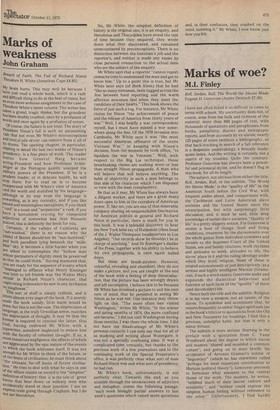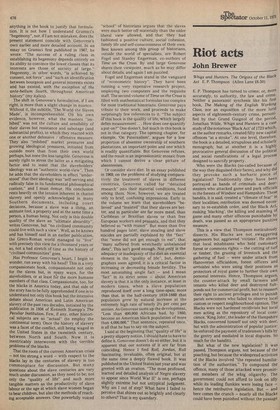Marks of woe?
M.I. Finley
Roll, Jordan, Roll, The World the Slaves Made Eugene D. Genovese (Andre Deutsch £7.50)
I have not often found it so difficult to come to terms with a book. My uncertainty does not, of course, arise from the bulk and richness of the .material; more than 600 pages of text, with thousands of quotations and paraphrases from books, pamphlets, diaries and newspaper reports, and from accounts by ex-slaves; nearly 125 pages of notes (without a bibliography, so that back-tracking in search of a full reference is a desperate undertaking); a brutally inadequate index. And the writing is certainly not a source of my troubles. Quite the contrary: Professor Genovese has always been a powerful and polemical stylist, and he doesn't flag in this book; for all its length.
The subject, not obvious from either the title, Roll, Jordan, Roll, or the subtitle, 'The World the Slaves Made,' is the "quality of life" in the American South before the Civil War, with frequent asides about, and comparisons with, the Caribbean and Latin American slave societies and the United States since the emancipation, but with surprisingly little discussion, and, it must be said, little deep knowledge of earlier slave societies. "Quality of life" is a pretty slippery notion. For Genovese it means a host of things: food and living conditions, treatment by the slaveowners over the whole gamut from individual overseers and owners to the Supreme Court of the United States, sex and family relations, work rhythms and attitudes to work, attitudes to life, the slaves' place in it and the ruling ideology under which they lived, religion. None of these is treated autonomously or just descriptively: as a serious and highly intelligent Marxist (Gramsclan, if such a word exists), Genovese seeks and expounds the dialectical behaviour and function of each facet of the "quality" of slave (and slaveholder) life. Hence both the title and the subtitle. Religion is in his view a weapon, not an opiate, of the slaves. To symbolise and accentuate that, he resorts frequently to either Negro spirituals (as in the book's title) or to quotations from the Old and New Testament for headings. I find this a precious, unhelpful habit, but that is only a minor irritant.
The subtitle is more serious. Starting in the preface with a quotation from C. Vann Woodward about the -degree to which slaves and masters "shared and moulded a common
culture", and going on to state briefly his acceptance of Antonio Gramsci's notion of "hegemony" (which he has elsewhere called "perhaps his most important contribution to Marxian political theory"), Genovese proceeds to formulate what amounts to the central theme of the work. The masters, he writes, "imbibed much of their slaves' culture and sensibility", and "neither could express the simplest human feeling without reference to the other." Unfortunately, I find hardly anything in the book to justify that formulation. It is not how I understand Gramsci's "hegemony", nor, if I am not mistaken, does the present statement coincide with Genovese's own earlier and more detailed account. In an essay on Gramsci first published in 1967, he wrote: "The success of a ruling class in establishing its hegemony depends entirely on its ability to convince the lower classes that its interests are those of society at large."
Hegemony, in other words, "is achieved by consent, not force'', and "such an identification between bourgeois and general interests exists and has existed, with the exception of the ante-bellum South, throughout American history" (my italics).
The shift in Genovese's formulation, if I am right, is more than a slight change in nuance.
Without it, the subtitle, 'The World the Slaves Made', is incomprehensible. On his own evidence, however, what the masters "im bibed" was not the culture and sensibility of their slaves but resistance and sabotage (and substantial profits), to which they reacted with one or another defensive / offensive measure. They also "imbibed" market pressures and growing ideological pressures, initiated from outside more than from their own world perhaps, but none the less tangible. Genovese is surely right to stress the latter as a mitigating 'factor and to insist that the slaveholders' ideology was an "authentic world-view". Then he adds that the slaveholders in effect "under stood" that their ideology was "self-serving and radically false in its fundamental philosophical content," and I must demur. His conclusion
rests heavily on the tension inherent in chattel slavery and openly acknowledged in many,
Southern documents, including court decisions, because a slave was a thing, an animate tool, a property and at the same time a person, a human being. Not only is this double quality of the slave an "ultimate absurdity", writes Genovese, but "no civilised community could live with such a view". Well, as he knows and has himself said in an earlier publication, the Greco-Roman world managed to "live" with precisely this view for a thousand years or so, not a bad stretch of time as the history of "civilised communities" goes.
Has Professor Genovese's heart, I begin to wonder, run away with his head? This is a very compassionate book, compassionate not only for the slaves but, in many ways, for the slaveholders, or at least for the more humane members of that class. Compassionate, too, for the blacks in America today, and that side of the story has to be fully apprehended if one is to understand not only this book but the intensive debate about American and Latin American slavery of the past two decades, initiated by the publication in 1956 of Kenneth Starripp's The Peculiar Institution. Few, if any, other historical subjects are so "actual" (to employ the continental term). Once the history of slavery was a facet of the conflict, still being waged in the United States in the twentieth century, between North and South. Now it is inextricably interwoven with the terrible problems of the blacks.
That the roots of the current American crisis — not too strong a word — with respect to the blacks lay in the centuries of slavery is too commonplace for discussion. But many questions about the slave centuries are very much under discussion, as they need to be; not only the "quality of life" and such more tangible matters as the productivity of slave labour or the age it which slave women began to bear children, but also the methods of reaching acceptable answers. One powerfully voiced "school" of historians argues that the slaves were much better off materially than the older.
liberal view allowed, and that they had fashioned a positive culture, social cohesion, family life and self-consciousness of their own.
Best known among this group of historians, outside the world of specialists, are Robert Fogel and Stanley Engerman, co-authors of Time on the Cross. By and large Genovese shares their viewpoint, much as he may differ about details, and again I am puzzled.
Fogel and Engerman stand in the vanguard of "econometric history". They have been running a very expensive research project, employing two computers and the requisite staff. The second volume of Time on the Cross is filled with mathematical formulas too complex for most traditional historians. Genovese pays tribute to their work, and proceeds to make surprisingly few references to it. "The subject
5i-this-book is the quilifY of life, which largelydefies measurement ... How does one quantify
a put-on?" One doesn't, but much in this book is not in that category. The opening chapter, for eiample. 'On Paternalism', argues for a low proportion of absentee ownership of southern plantations, an important point and one which is readily quantifiable. But Genovese refuses, and the result is an impressionistic mosaic from which I cannot derive a clear picture of absenteeism.
Or consider slave diet. In an essay published in 1969, on the problems of studying compara tively the treatment of slaves in different countries, Genovese called for "detailed research" into their material conditions, food among them. Now, however, we are treated only to brief, confusing impressions. Early in the volume we learn that slaveholders "be lieved" and "insisted" that their slaves are bet ter, and in particular ate far more meat, than Caribbean or Brazilian slaves or than free European workers and peasants, and that they believed so "with reason". But more than five hundred pages later, slave stealing and slave suicides are partially explained by the "fact" that "some did not get enough to eat", that "many suffered from wretchedly unbalanced diets". This isn't good enough. Not only is the adequacy or inadequacy of the diet an essential element in the "quality of life", but, demo graphers seem agreed, it is a critical factor in increasing or decreasing female fertility. The most astonishing single fact — and I mean "fact" in its strict sense — about American slavery is that it is the only instance, at least in modern times, when a slave population reproduced itself over a long time-span; more than that, in the half-century 1810-1860 that population grew by natural increase at the extremely high rate of 'nearly 21/2 per cent per annum. As Genovese sums up the development, "Less than 400,000 Africans had, by 1860, become an American black population of more than 4,000,000." That sentence, repeated once, is all that he has to say on the subject.
I said at the beginning that "quality of life" is a pretty slippery notion. I should hate to have to define it. Genovese doesn't do so either, but it is apparent that our notions of it are far from coinciding. Hence I find Roll, Jordan, Roll fascinating, invaluable, often original, but at the same time a deeply flawed book. It was published in the United States last year and was greeted with an ovation. "The most profound, learned and detailed analysis of Negro slavery to appear since World War II" is one, perhaps
slightly extreme but not untypical judgment. Why am I out of step? What have I failed to perceive that shines out so brightly and clearly to others? That is my quandary.



































 Previous page
Previous page